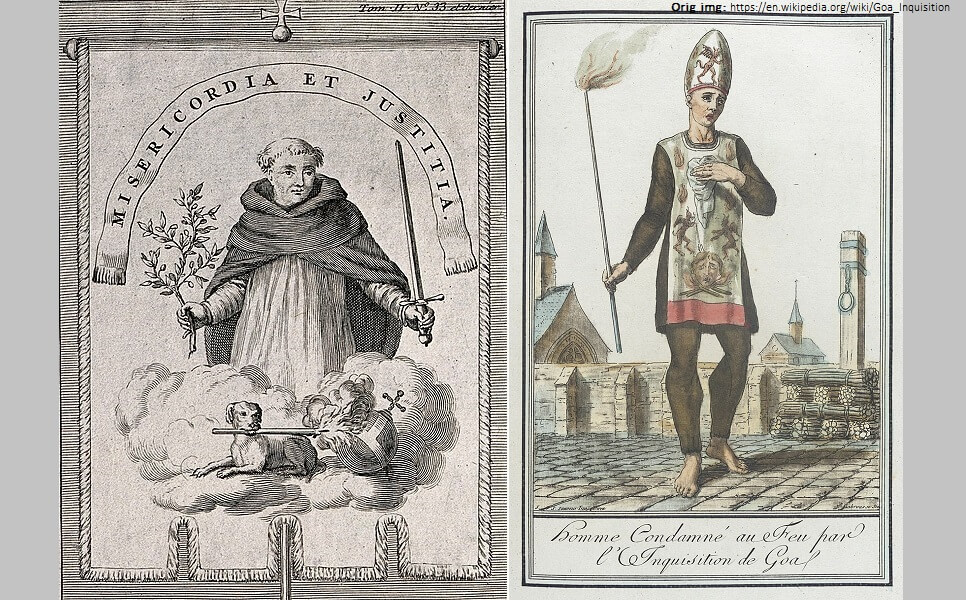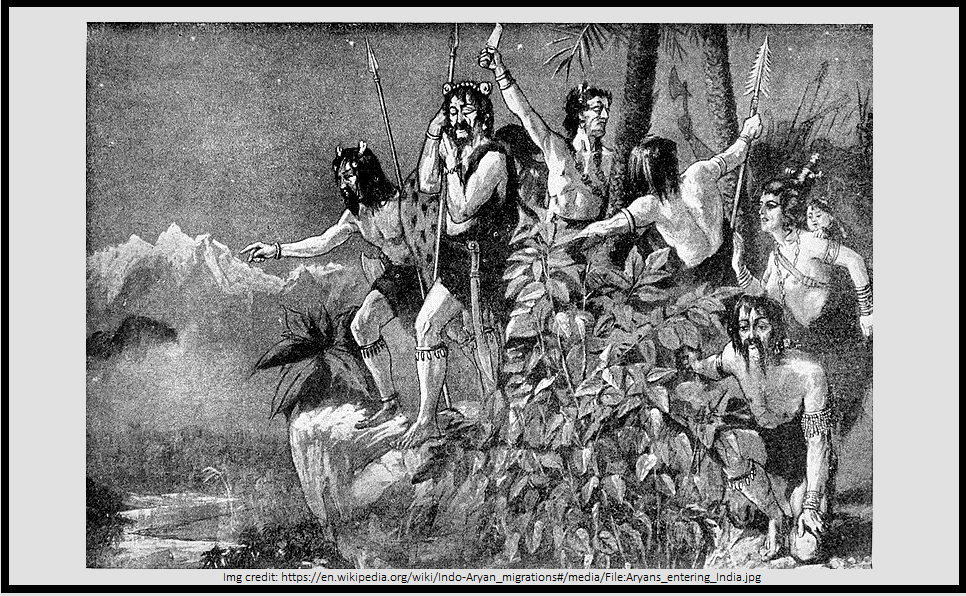The first part of Goa Inquisition covered the background of the Goa Inquisition and anti-hindu laws targeting marriage customs, childbirth customs and death customs during the Goa Inquisition. In the second part, we will focus on humiliation and banishment of Hindus, laws depriving Hindus of their means of livelihood, snatching of Hindu orphans and privileges available on conversion during Goa inquisition. It is important to reiterate that the Goa inquisition by Portuguese is considered to be one of the most violent inquisitions by historians.
Banishment of Hindus
- A large number of Brahmins, whose names were included in Viceroy’s order, were thrown out of Goa. They were given one month within which to dispose of their property.
- Persons of the Goldsmith caste, who had their families and properties outside the Portuguese territories and didn’t bring back their families and property within a period of 10 days were banished.
- At certain times in each year, information regarding Brahmins, physicians and any other infidels who might be prejudicial to the conversion to Christianity were obtained to issue orders for banishing them.
Ban on Hindu Priests
Hindu preachers, Joshis, or Gurus of temples or any other person who held a religious office among the Hindus or were the heads or supporters of the religions of the Hindus were asked to leave within one month failing which they would be held as captives for service in the docks.
Compulsory listen to gospel
An order was passed making it compulsory for all Hindus and their family members to listen to the preaching of the Holy Gospel at the places assigned for this purpose. This was later suspended owing to mass exodus of Hindus which resulted in decline of trade and commerce as well as depletion in the royal treasury.
Laws depriving Hindus of their means of sustenance
- Hindus, irrespective of his their status or condition, were forbidden to hold public office. For all the offices, which it is customary to give to the natives of the land, had to be given to the Christians and not to the Hindus.
- Public officials were forbidden to use the services (in matters of the office) of any Brahmin or other infidel. Those officials who utilize their services shall incur the penalty of losing his office, and the said Brahmins shall become captive, and lose all their property.
- Officials were forbidden to enter the houses of Brahmins and other infidels nor speak or have dealings with the latter directly or through third parties
Forcible conversion of the Hindu Orphans
In 1559, the following order related to Hindu orphans was passed:
The Hindu children in Goa, who are left without father, mother, grandfather, grandmother or other ascendant lineals, should be taken immediately and handed over to the College of St. Paul of the Society of Jesus for being baptised, educated and indoctrinated.
This order was originally intended to be applied to orphans who had neither parents nor grandparents or other elderly relatives. But there were frequent complaints that even children whose mother and grandparents were living were being snatched away from their families for being baptized. There were also cases where children were removed from their families even during the lifetime of their fathers.
At times, the Hindus hid their orphans or moved them outside Portuguese territories to prevent them from being baptized.
In 1718 another order was passed stating that no Hindu man or woman having sons or grandsons aged less than 14 years or daughters or granddaughters aged less than 12 years should move them outside Portuguese territories. Also, this should not be done by any other Hindu on the death of fathers or grandfathers of the minors. Doing so will result in confiscation of their estate and those who do not possess any estate shall incur the penalty of whipping and banishment for a period of ten years. They can be relieved from these penalties only if they hand over the orphans who have been moved.
When children were snatched away from their families for being baptized, their share of the estates also went with them. In many cases, the entire Hindu family became Christian out of love for a child who had been baptized. Because of this advantage in conversion of children, the Holy Office assisted in this abuse of law. Many orphans were snatched just by the desire to take charge of their estates. There were cases where orphans who had been taken away from their families were returned on receiving money. Unscrupulous persons also extorted money from Hindu families by threatening to report orphans to the Inquisitors.
Note:- It is stated that disputes arose continuously between Shivaji and the Portuguese. The chiefest cause of his hatred was forcing orphans of his caste to turn Roman Catholic
- Hindu Pandits and physicians should not move in the city on horseback or in andores (a kind of sedan-chair) or palanquins. Doing so will incur a fine of 10 crusados (currency) on the first occasion, a fine of 20 crusados (currency) and loss of the horse and/or palanquin on the second occasion and imprisonment on the galleys on the third occasion.
- The Christian boias (carriers of palanquins, andores, etc.) should not carry Hindus.
- Christian agricultural laborers were forbidden to work in the lands owned by the Hindus and the Hindu landowners were prohibited to employ Christian laborers.
Privileges available on conversion
- Hindus who embraced Christianity would be exempted from the payment of land-tax for a period of fifteen years.
- Slaves of infidels who converted themselves to Christianity would be freed.
- According to the Hindu law, if a person died without leaving male children, his wife and daughters did not inherit his property. However, if the widow and daughters or the surviving relative who is the nearest of kin to the deceased became Christians, they would inherit the property.
- The sons, grandsons and other relatives of a Hindu individual will inherit his estate on his death only if they become Christians.
- If the wife of a converted Hindu is separated from her husband on the ground that the husband adhered to his old religion, she got one half of the husband’s estate during his lifetime.
- If a son or daughter of a Hindu father became Christian, they were entitled to one-third of the father’s estate, even during his lifetime and would inherit the remaining portions father’s death.
Regulation of books
- Before a book could be printed, a license to print had to be obtained from the Inquisitors. Each book, whether printed locally or brought from outside, was examined to see that they contained nothing against Catholic faith or good customs.
- Bookshops were visited multiple times every year to examine if there were any books which were banned or which contained anything against the Catholic religion or customs.
- All books written in Sanskrit and Marathi, whatever their subject matter, were seized and burnt on the suspicion that they might deal with idolatry.
The insecurity in life and resulting harassment from inquisition was so great that many of the Hindus and native converts left the land of their birth and settled down in the neighbouring territories outside the jurisdiction of the Inquisition. Thousands of Konkani-speaking families, both Hindu and Christian, who are found scattered in various centres in Mysore, Kerala and Madras today are the descendants of these emigrants.
Goa Inquisiton in words for historian
Goan historian, J.C. Barreto Miranda, speaks of the cruelties of the Inquisition of Goa in the following words:
“The cruelties which in the name of the religion of peace and love this tribunal practised in Europe, were carried to even greater excesses in India, where the Inquisitors, surrounded by luxuries which could stand comparison with the regal magnificence of the great potentates of Asia, saw with pride the Archbishop as well as the viceroy submitted to their power. Every word of theirs was a sentence of. death and at their slightest nod were moved to terror the vast populations spread over the Asiatic regions, whose lives fluctuated in their hands, and who, on the most frivolous pretext, could be clapped for all time in the deepest dungeons or strangled or offered as food for the flames of the pyre.”
Reference:
The Goa Inquisition – The terrible tribunal for the East – A K Priolkar


